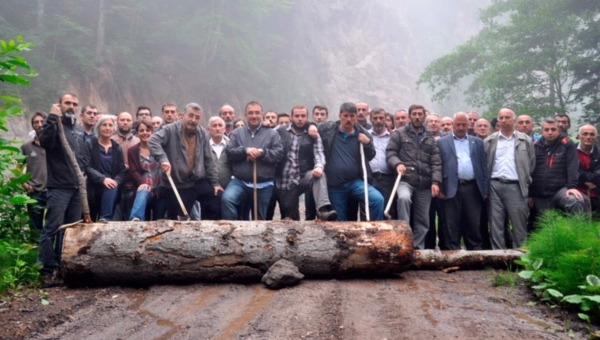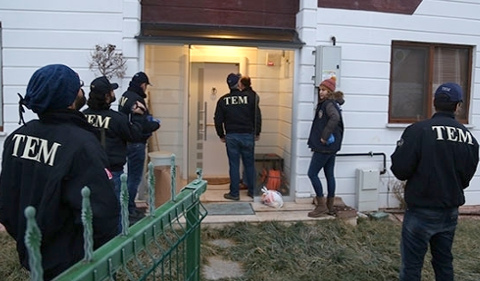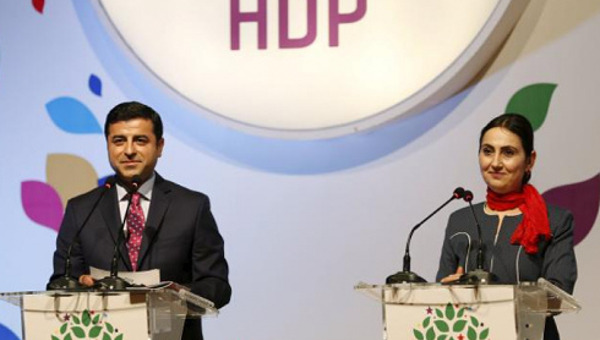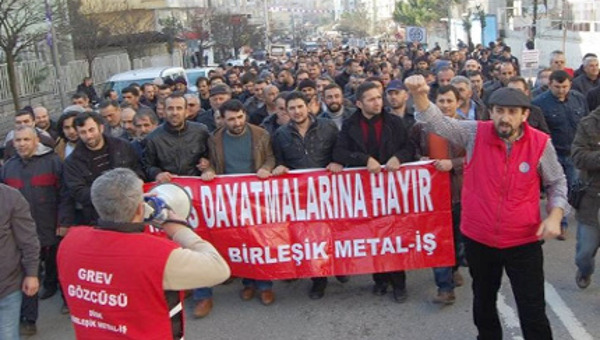Interview with Erdem Yörük
After Turkey’s parliamentary elections last week, all eyes are on the Peoples’ Democracy Party (HDP) after its successes in contesting its first ever election as a party, rather than a coalition of nominally independent candidates: a momentous decision on the part of the party leadership, which stands to gain clout in parliament and solidify its position as the electoral standard-bearer of the radical Left. At issue is whether the party has succeeded at building a leftist coalition including, but not limited to, its base of support in the Kurdish national movement. At stake is whether or not the party will play a key role in a successful effort to block Recep Tayyip Erdoğan’s Justice and Development Party (AKP) from gaining the number of seats necessary to rewrite the constitution and transform Turkey into an executive republic with Erdoğan as its quasi-omnipotent head.
The importance of the relatively new left-wing party in the election had not gone unnoticed by those whose tactic is violence. In the last days assaults on HDP activists and others working for the party mounted, with four people killed in a party rally in Diyarbakir, most likely by far-right forces, in an apparent attempt to assassinate party co-chairman Selahattin Demirtas, who was standing about thirty meters from where the bomb exploded.
Over the last few decades violence both physical and structural has played a major part in the creation of a sociopolitical terrain in which, in proletarian sections of many major cities, the AKP and the HDP are now the two parties fighting over votes.
Recently LeftEast editors sat down with Erdem Yörük, sociologist at Koç University in Istanbul and expert on the recent history of the working class in Turkey, to discuss these historical developments and assess the HDP’s chances of making history in this critical election. This interview was conducted prior to the election (see results here) and first published on the LeftEast website.
LeftEast (LE): Your work provides some perspectives on the changing face of the labour movement in Turkey in relation to the plight of Kurdish workers displaced by the state’s war with the PKK (Kurdistan Workers’ Party) in the 1980s and 90s. Could you briefly sketch for us the direction that your work takes in this regard?
Erdem Yörük (EY): It was in the aftermath of the shift in economic planning that happened around 1980, that the whole face of the working class in Turkey changed. In the late 1970s and early 1980s, the developmentalist economy featuring tariff protections, state-owned enterprises and an emphasis on agricultural self-sufficiency gave way to an export-economy fueled by low-wage labour by a new class: the informal proletariat. The plans for this shift were laid early in 1980 and solidified under the military regime and in its immediate aftermath. These reforms weakened the position of small farmers in the overall economy, necessitating internal immigration to the cities in search of wage-labour – and other forces augmented this trend.
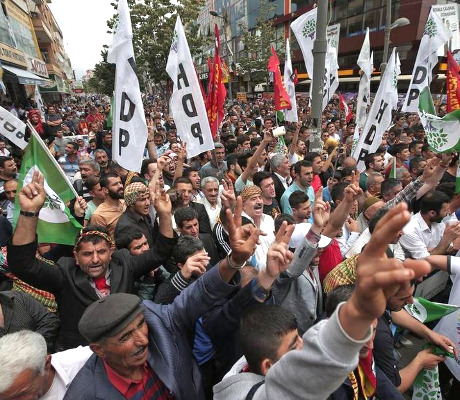
As far as the labour movement is concerned, of course the general suppression of the Left during the 1980 coup played a role here, but a still more significant factor in the decline of organized labour and the rise of the informal proletariat was the war between the state and the PKK. Internally displaced Kurds who left villages that had been destroyed by the army or an economy generally ruined by war were desperate, and willing to do even the worst jobs, without social security or job security, often on a temporary basis, in what came to be known as the informal sector. These people swelled into the big cities, which were on every level – in terms of housing, infrastructure, health – barely able to accommodate them, and everything in their daily lives became a matter of makeshift solutions and negotiation. Without these wage-labourers at the bottom of the economic pyramid, the industries that have grown in Turkey over the last few decades would not have gotten off the ground; the country’s economic growth that has gotten such press internationally is due to their labour.
The huge changes to the class landscape brought about by neoliberalism were bound to have political consequences as well. The 1980s were a time of political tranquillity in Turkey, but in the 1990s ideological competition in Turkish politics really intensified, with political Islam on the ascendant. Because political Islam was able to organize social aid on a local and communitarian basis, it filled the vacuum left by a retreating Left that had not adjusted to the new realities of the informal economy, and managed to address the destitute workers of the cities and earn their loyalty. The Kurdish national movement did similar things. Meanwhile the labour unions, which were unable to absorb the huge influx of internal immigrants and in any case restricted in various ways by anti-union legislation, went into decline.
LE: Your dissertation concerns welfare policy as an instrument of social control. How does this work under the AKP?
EY: The distribution of charity by the representatives of political Islam – not only the AKP but also its predecessors including the Welfare Party (Refah Partisi) going back to the 1980s and 1990s, has had two goals: not only to maintain control through dependence, but to cultivate political support. The party cultivates support from impoverished workers by distributing aid on the understanding that membership in the right cultural and religious community positively affects the chances of getting aid. The goal is to foster a sense of community and common belonging among these people that translates into support for the party. Since coming to power, the AKP government has specifically targeted Kurdish citizens as recipients of its strategic generosity, while still ruthlessly combating other forces, such as the Kurdish national movement, which might become rivals for these people’s loyalty.
LE: Since 2002 the government has very skillfully built up a system of patrimonial charity to substitute for the kind of working-class solidarity one finds in the labour movement; it has increased non-pension welfare spending while attacking the unions. What can or should the Left do in response to this strategy?
EY: Many leftists in Turkey have traditionally opposed welfare provision, arguing instead for more structural solutions. Of course they are right to insist that structural solutions are necessary, but in the meantime people are hungry and want to know who is going to help them. I think this has been a serious problem for the Left in Turkey. When someone is hungry, telling him you have a structural solution to that is just not going to be convincing. You have to give him something in the short term while continuing to work on your structural solutions for the long term. Right now many in the informal proletariat are dependent on aid from the government, which is being given out as a favor that can be revoked at any time. What the Left should do is to develop the notion that such aid is not a favor but a right. This is what has to be done.
LE: President Erdoğan recently declared that “there is no longer a Kurdish problem in Turkey,” as if the Kurds or their condition had been a problem but that his government had solved it. This kind of negationist rhetoric was the standard discourse on the Kurdish movement for Turkish governments before the AKP; both the center-left Bülent Ecevit and the Islamist Necmettin Erbakan embraced it. What do you think the return to this rhetoric signals as far as policy in the near future is concerned?
EY: Such statements are purely tactical. Erdoğan is approaching an election and he knows that the nationalist votes outnumber the votes in favor of a peaceful solution to the conflict. Later he may move back. He has made such tactical moves before, and he will probably make them again.
LE: Many international leftists now see the Peoples’ Democracy Party (HDP) as the great hope for a revival of the Left in Turkey. Do you think these hopes are well placed?
EY: I do, and I’ll tell you, I am a member of the party and active within in, and I believe very much in its promise; in short I believe that the HDP can break the impasse Turkish politics is currently in and help democratize the country. I am not Kurdish myself, I am an ethnic Turk, and I joined the party because of the principles it espouses. It is not only a Kurdish party but rather aspires to be a broad coalition for the Left in Turkey. They have reached out to various minority communities, to the LGBT community…
LE: Yet at the same time some of its parliamentarians, for instance Altan Tan, have said that they did not like this outreach and, if I remember correctly, refused to be photographed with the LGBT activists at the event that the party leadership had organized for them.
EY: Yes, Altan Tan took that stance, and he represents a reality among conservative Kurdish constituency. We have to remember that the political and social composition of the HDP coalition is quite heterogeneous. Yet the party is working not only to advance the rights of the Kurdish people, but also to expand the hegemony of the left in whole Turkey and among the Kurds alike, and by doing that they are taking a risk. They are allying themselves to the LGBT community, the Alevis and other excluded groups, even at the risk of alienating more conservative, religious elements within the Kurdish constituency. Let’s remember that both conservatism and religion are more prevalent among the Kurds than among the citizens of Turkey taken as a whole. And some of those conservative Muslims are very active and important figures in the party, and so you have Altan Tan. And Altan Tan is a Muslim; Altan Tan is pious. And he is a very important figure in Kurdistan. Yet at the same time the party has been joining forces with the LGBT community, feminists and other groups. What the party does deserves our respect: trying to raise the hegemony of the left while forming alliances with all progressive forces, Muslim or non-Muslim.
LE: Recently there was a poll bandied about in the Turkish press that purported to show a large portion of the Kurdish residents of Istanbul, a majority of whom voted for the ruling party in 2011, now supporting HDP. Do you think such reports are accurate and if so, do they signal a nationwide trend?
EY: Yes, I think such reports are accurate. I think a similar shift is taking place elsewhere in the country as well. Kobane is the turning point. Polls show that before Kobane, 50 per cent of Kurds in Turkey voted for the AKP, and 40 per cent for the HDP. Now it is 60 per cent for the HDP and 30 per cent for the AKP. Kurds felt extremely disappointed and threatened during the battle for Kobane.
LE: Many in the ulusalcı or left-nationalist camp suspect that the HDP may be willing to suspend its opposition to Erdoğan nationally in return for a successful conclusion to the negotiations between the state and the PKK. Turkey would then be left with an all-powerful Erdoğan presidency along with regional autonomy for the Kurdish regions. What do you think of such fears?
EY: First of all, a couple of months ago, the ulusalcı solcular, the nationalist leftists said that the HDP had decided to join the election as a party because they had made a deal with the ruling party: that they would stay outside the parliament intentionally in order to support the AKP. This was the conspiracy theory, and it was a most stupid one, a racialist one as it blames the Kurds for being stupid… and now that the HDP is organized so deeply in the elections, this kind of conspiracy theory has just disappeared, but another one has taken its place. This second conspiracy theory holds that the HDP would support the presidency of Erdoğan. And Selahattin Demirtaş said, seni Başkan yaptırmayacağız! “We will not make you president!” So this conspiracy theory too has disappeared. So now the third one: that the HDP will make a coalition with the AKP. Demirtaş said “We will not make a coalition with the AKP.”
So the party will respond to this conspiracy theory and next week another conspiracy theory will emerge, because there is a big sense of distrust, a structural distrust of the Kurds. The nationalist Left sees the Kurds as terrorists and they see the HDP as the party of the Kurds. There’s this logic: Kurds have their own particular interests, and these interests can be traded with the AKP at the expense of the interests of the Left and of the other components of the country. But this kind of logic misses the fact that the HDP itself is a huge coalition of different groups. Kurds are the largest part, but in terms of the administrators, the activists, and the supporters of the party, half of the party consists of socialists, LGBT people, women, Alevis, etc., and these groups know that if Erdoğan gets what he wants, I mean if the authoritarian tendencies of the AKP increase, they will become the first targets of this tendency. This other part will never let the party ally itself to the AKP. This is the structural guarantee of the impossibility of this kind of an alliance. So this too is complicated but to make a long story short, this kind of an alliance is only a conspiracy theory.
Also, there is one more concrete thing to falsify these conspiracy theories. During the last couple of months, the AKP has based its elections campaign almost exclusively on developing hatred toward the HDP. This has manifested itself in several physical attacks on the party. Yesterday, in HDP Diyarkabır meeting, bombing killed 4 people. Before Adana and Mersin headquarters of the HDP were bomb-attacked. So far during the campaign, 175 of our election bureaus have been attacked. One of our campaign staff was first tortured and then killed, one of them was burned and he is still in intensive care in the hospital. Many ballot observers have recently been taken into custody. These are systematical attacks on the HDP and many people find the government responsible.
LE: Do you think that the traditional center-left opposition, for instance the Republican People’s Party (CHP), has any role to play in the construction of a more just and democratic Turkey, or have they missed that chance?
EY: They have lost that chance for the last eighty years, actually… but it seems that they have taken some lessons in the last couple of years. With pressure from the HDP they have moved to the left. They have made some proposals that appeal to the working class and some members of the CHP have said they would consider making an alliance with the HDP as well. These are positive things that are good for democracy in Turkey. I don’t think that the CHP is a real candidate for government in this election, as the polls show them with only 26-27 per cent of the vote, but in the future things may change.
LE: …in which case the CHP’s new openness to work with groups like the HDP would be of benefit both to them and to the country.
EY: I think so.
LE: What relation, if any, do you think the ruling party’s conservative cultural agenda bears to the class struggle in Turkey?
EY: I think that during the last ten years AKP has hijacked the class struggle in Turkey. They have mobilized all the class-related grievances of the working class with an anti-elite discourse, a populist discourse, and populist policies also – the social policy etc.; the AKP has presented itself as the representative of the working class, the millet, and it claims that the CHP represents the elite, the upper class and westernized people, and the West. There is some kind of reality behind this, because when you look at the statistics, there’s a positive correlation between income level and CHP voting and a negative correlation between income level and AKP voting. The AKP is a bourgeois party that pretends to represent the working class. It’s like Louis Bonaparte…
LE: … which as we know in the Marxist tradition tends to be seen as the anticipation of fascism, right?
EY: Yes. So what do they say about history? The first time a tragedy, the second time a farce, and the third time… I don’t know!
So the classes have formed their identity between these two parties: the lower middle class supports the AKP and the upper middle class the CHP; the HDP is trying to break down this polarization and become the party of the working class of different ethnic and religious groups and democratic factions of the middle class. Because insofar as political discourse continues the way it has been going, it is really difficult to conduct a real class struggle in the country. Religiosity increases among the working class, and conservatism increases among the working class, and the AKP has tried to eliminate any other kind of discourse among the working class. So this is why I think the first agenda of the Left in the country is to struggle against the government. •


